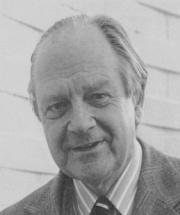Difference between revisions of "Richard Clutterbuck"
| Line 2: | Line 2: | ||
style="float:left;width: 180px;margin:0 0 1em 1em"> | style="float:left;width: 180px;margin:0 0 1em 1em"> | ||
[[Image:Clutterbuck.jpeg|180px|right|thumb]] ''Major-General Richard Clutterbuck'' | [[Image:Clutterbuck.jpeg|180px|right|thumb]] ''Major-General Richard Clutterbuck'' | ||
| − | </div>Major General Richard Clutterbuck was one of the seminal counter-insurgency theorists of the 1960s and early 1970s and was closely associated with the St Andrews [[Centre for the Study of Terrorism and Political Violence]] set up in 1993. | + | </div>Major General Richard Clutterbuck was one of the seminal counter-insurgency theorists of the 1960s and early 1970s and was closely associated with the St Andrews [[Centre for the Study of Terrorism and Political Violence]] set up in 1993. Clutterbuck's ideas on counter-insurgency were developed through his military experience in 13 post-war UK colonial conflicts. He was a member of the Advisory Council at the St Andrews Centre from its inception until his death in 1998. After Clutterbuck's demise, his archive was left to the St Andrews Centre and his lasting influence on the Centre has been noted by senior members. In his introduction to British Perspectives on Terrorism, Director of the St Andrews Centre, [[Paul Wilkinson]] recognizes this intellectual lineage, paying tribute to the work of both Clutterbuck, and [[Frank Kitson]], yet another British Army commander turned counter-insurgency theorist. |
| + | |||
| + | Clutterbuck helped pioneer the development of the [[Control Risks Information Service]], designed to 'brief business and industry on political violence around the world'[http://www.st-andrews.ac.uk/academic/intrel/research/cstpv/pages/clutterbuck.html]. | ||
Revision as of 16:59, 14 March 2006
Major General Richard Clutterbuck was one of the seminal counter-insurgency theorists of the 1960s and early 1970s and was closely associated with the St Andrews Centre for the Study of Terrorism and Political Violence set up in 1993. Clutterbuck's ideas on counter-insurgency were developed through his military experience in 13 post-war UK colonial conflicts. He was a member of the Advisory Council at the St Andrews Centre from its inception until his death in 1998. After Clutterbuck's demise, his archive was left to the St Andrews Centre and his lasting influence on the Centre has been noted by senior members. In his introduction to British Perspectives on Terrorism, Director of the St Andrews Centre, Paul Wilkinson recognizes this intellectual lineage, paying tribute to the work of both Clutterbuck, and Frank Kitson, yet another British Army commander turned counter-insurgency theorist.
Clutterbuck helped pioneer the development of the Control Risks Information Service, designed to 'brief business and industry on political violence around the world'[1].
